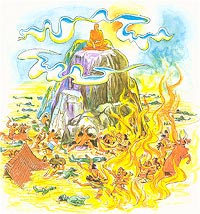06 01 2012 LESSON 486 Verse 28 The Sorrowless View The World Mahakassapatthera Vatthu
Pamadam
appamadena
yada nudati pandito
pannapasadamaruyha
asoko sokinim pajam
pabbatatthova bhumatthe
dhiro1 bale2 avekkhati.
Verse 28: The wise one dispels negligence by
means of mindfulness; he ascends the tower of wisdom and being free from sorrow
looks at the sorrowing beings. Just as one on the mountain top looks at those
on the plain below, so also, the wise one (the arahat) looks at the foolish and
the ignorant (worldlings).
His fermentation of sensuality ended, his ignorance washed away,
his fermentation of becoming exhausted: one totally released, acquisition-free,
bears his last body, having conquered Mara along with his mount.
FREE ONLINE eNālandā Research & Practice
UNIVERSITY &
BUDDHIST GOOD NEWS LETTER through Through http://sarvajan.ambedkar.org
THE BUDDHIST ON LINE GOOD NEWS LETTER
COURSE PROGRAM
LESSON
486
Practice a Sutta a Day Keeps Dukkha Away

Verse 28. The Sorrowless View The World
When one who’s wise does drive away
heedlessness by heedfulness,
having ascended wisdom’s tower
steadfast, one surveys the fools,
griefless, views the grieving folk,
as mountaineer does those below.
Explanation: The wise person is always
mindful. Through this alertness he discards the ways of the slothful. The wise
person ascends the tower of wisdom. Once he has attained that height he is
capable of surveying the sorrowing masses with sorrowless eyes. Detached and
dispassionate he sees these masses like a person atop a mountain peak,
surveying the ground below.
Dhammapada Verse 28
Mahakassapatthera Vatthu
Pamadam appamadena
yada nudati pandito
pannapasadamaruyha
asoko sokinim pajam
pabbatatthova bhumatthe
dhiro1 bale2 avekkhati.
Verse 28: The wise one dispels negligence by
means of mindfulness; he ascends the tower of wisdom and being free from sorrow
looks at the sorrowing beings. Just as one on the mountain top looks at those
on the plain below, so also, the wise one (the arahat) looks at the foolish and
the ignorant (worldlings).
1. dhiro: the wise one; in this
context, the arahat.
2. bile: the foolish; in this context,
the worldings.
The Story of Thera Mahakassapa
[ Read longer version of story here ]
While residing at the Jetavana monastery, the
Buddha uttered Verse (28) of this book, with reference to Thera Mahakassapa.
On one occasion, while Thera Mahakassapa was
staying at Pipphali cave, he spent his time developing the mental image of
light (aloka kasina) and trying to find out through Divine Vision,
beings who were mindful and beings who were negligent, also those who were
about to die and those who were about to be born.
From his monastery, the Buddha saw through his
Divine Vision what Thera Mahakassapa was doing and wanted to warn him that he
was wasting his time. So he sent forth his radiance and appeared seated before
the thera and exhorted him thus: “My son Kassapa, the number of births
and deaths of beings is innumerable and cannot be counted. It is not your
concern to count them; it is the concern only of the Buddhas.”
Then the Buddha spoke in verse as follows:
|
Verse 28. The wise one dispels negligence by means of |
§ 57. {Iti 3.8; Iti 49}
This was said by the Blessed One, said by the
Arahant, so I have heard: “There are these three fermentations.
Which three? The fermentation of sensuality, the fermentation of becoming, the
fermentation of ignorance. These are the three fermentations.”
His fermentation of sensuality ended, his ignorance washed away,
his fermentation of becoming exhausted: one totally released, acquisition-free,
bears his last body, having conquered Mara along with his mount.